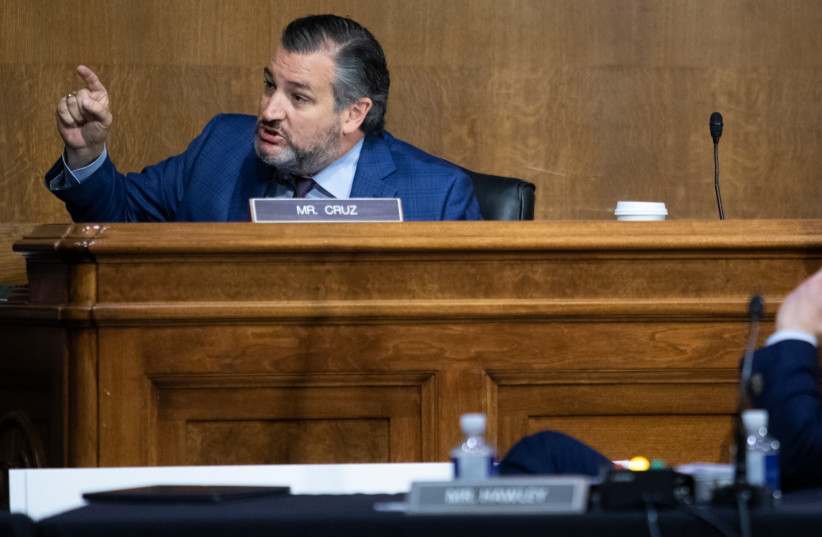WASHINGTON – A bipartisan group of 21 lawmakers has sent a letter to US President Joe Biden, expressing concern over a potential nuclear agreement with Iran.
“Since the beginning of this administration, we have hoped that renewed negotiations with Iran would achieve a longer and stronger agreement than the JCPOA with clear nuclear restrictions and provisions addressing Iran’s international terror and missile programs,” they wrote.
“Among other issues, we are highly concerned about reports indicating the potential lifting of the Foreign Terrorist Organization designation of the Islamic Revolutionary Guard Corps and of the sanctions placed on members of the office of the supreme leader.”
Representatives Josh Gottheimer (D-New Jersey), Elaine Luria (D-Virginia) and Tom Reed (R-New York) spearheaded the letter, which was sent on Thursday.
“Without adequately addressing Iran’s role as the world’s leading state-sponsor of terror – which was noticeably absent from the 2015 JCPOA – and simultaneously providing billions of dollars in sanctions relief, the United States would be providing a clear path for Iranian proxies to continue fueling terrorism,” they wrote.

It is “hard to envision supporting an agreement along the lines being publicly discussed,” they added.
On Wednesday, a group of Senate Republicans led by Sen. Ted Cruz (Texas) called on the Biden administration to submit any future agreement as a treaty. Such a move would require a two-thirds majority to support the deal.
“If this deal goes forward, it will have no effect unless and until it is submitted to the Senate as a treaty and ratified by two-thirds of the Senate,” Cruz said at a press conference. “If it were actually a good deal, it should be able to get ratified by two-thirds of the Senate.”
“The chances that Biden will submit it as a treaty are 0.0%,” he added.
“Under existing statute, it is required to submit it for congressional approval,” Cruz said. “You may see the Biden administration try to stiff Congress even on that. But if this administration tries to ram through a terrible deal in Congress, you could expect Congress to do everything possible to resist a deal that gives Iran the resources to develop a nuclear weapon.
“And you could rest assured that on January 20, 2025, the next presidential administration, which I believe will be a Republican administration, will rip to shreds whatever terrible deal Biden gives away to Putin and the ayatollahs.”
In response to a question from The Jerusalem Post regarding the best path forward if the deal falls apart, Cruz said: “The only approach that has a prayer of working is maximum pressure. [During the president Donald] Trump administration, there was a vigorous debate within the administration about whether to pull out of the [president Barack] Obama nuclear deal. Both the State Department and the Defense Department argued for staying in the deal.”
“I made the case personally to President Trump that the deal was a terrible deal, that it was a profound threat to our national security and that we should pull out of it,” he said. “Ultimately, President Trump agreed with me and overruled his own secretary of state, his own secretary of defense and pulled out of the deal.
“After that happened, I pressed the Trump administration repeatedly to eliminate specific waivers that remained in place. For example, there was an oil waiver that allowed Iran to continue to sell a million barrels of oil a day. At my urging, the Trump administration ended that oil waiver, which put enormous economic pressure on the regime.
“At my urging, the Trump administration ended the various civilian nuclear waivers that were in place. All of those increased the pressure on the regime, made them more vulnerable and ensured that they had far fewer resources to devote to developing nuclear weapons.
“That’s the approach that the Biden administration should take. Is there any realistic chance that Joe Biden will pursue that? No, he has decided as a political matter that appeasement is his approach to Iran, and that’s what makes it so incredibly dangerous,” Cruz said.
Meanwhile, the American Jewish Committee (AJC) has sent a letter to Secretary of State Antony Blinken, expressing concerns about the prospect of restoring the 2015 nuclear agreement with Iran.
Blinken stated in the past that the administration’s objective in reentering negotiations with Iran “was to produce a longer and stronger” agreement, implying recognition of the unfulfilled aspirations of the 2015 nuclear deal,” AJC CEO David Harris wrote.
The AJC opposed the original JCPOA, he said, adding: “Much of what we feared in 2015 has come true. In the six-plus years since the deal was implemented, Iran’s regional behavior has crossed one red line after another, with periodic missile and drone attacks by Iran and its proxies on US, Israeli, and GCC targets. Its missile program has advanced.”
Following the US withdrawal from the JCPOA in 2018, Iran “has leapt ahead in the deployment of sophisticated centrifuges and the stockpiling of near-weapons-grade fissile material,” Harris wrote.
“It is AJC’s earnest hope that the process underway in Vienna since last spring will yield the agreement you set as your goal,” he wrote. “If, on the other hand, the final result in Vienna is a return to essentially the same inadequate 2015 package, which replenishes Iranian coffers and leaves our regional allies exposed to escalating conventional threats, we will be left to wonder on what basis such an agreement advances regional and global security.”
